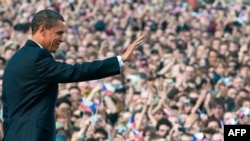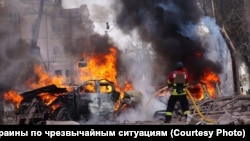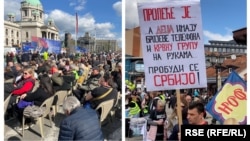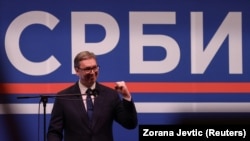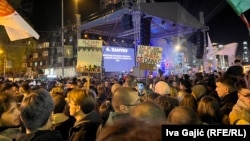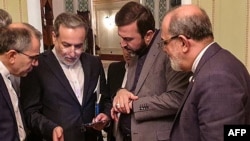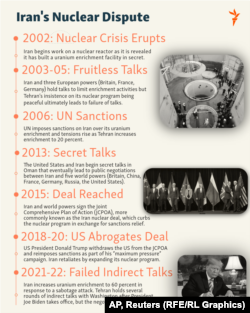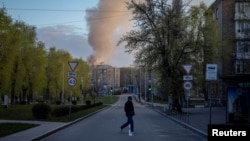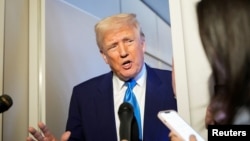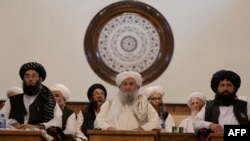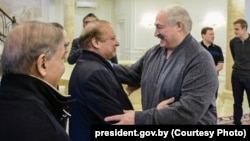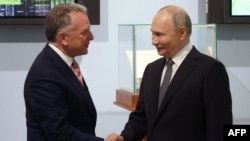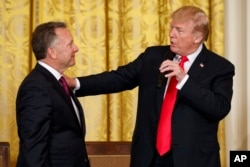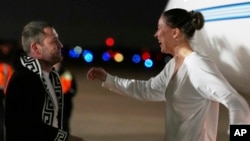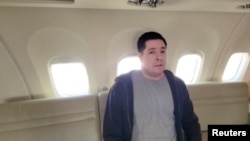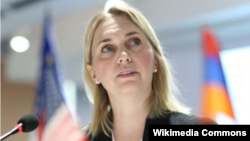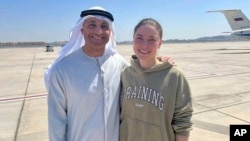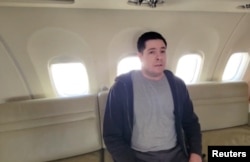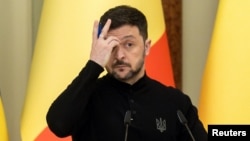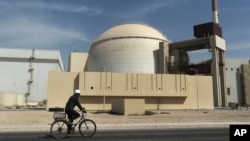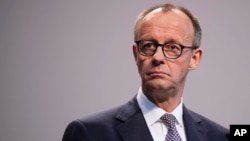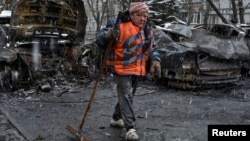Iranian and US negotiators agreed to a second round of high-level talks over Tehran's nuclear programs next week after meeting on April 12 for more than two hours of what both sides described as a "positive" and "constructive" session.
"The discussions were very positive and constructive," the White House said after the meeting in the Omani capital of Muscat.
It said special US envoy Steven Witkoff underscored "that he had instructions from President [Donald] Trump to resolve our two nations’ differences through dialogue and diplomacy, if that is possible."
"These issues are very complicated, and special envoy Witkoff’s direct communication today was a step forward in achieving a mutually beneficial outcome," the statement said, adding that "the sides agreed to meet again" on April 19.
Later, Trump, responding to reporters' questions about the talks, said, "I think they're going OK."
"Nothing matters until you get it done, so I don't like talking about it. But it's going OK. The Iran situation is going pretty good, I think," he told reporters aboard Air Force One.
The indirect meetings -- mediated by Oman -- are the first by officials from both countries on the issue in years and come amid spiraling tensions and mounting military threats from Washington.
Officials said the delegations were situated in separate room and exchanged messages through Omani Foreign Minister Said Badr.
Oman, on the southeastern coast of the Arabian Peninsula, has served as an intermediary between Iran and Western nations, including during talks that led to the release of several foreign citizens and dual nationals held by Tehran.
Witkoff's counterpart in the talks was Iranian Foreign Minister Abbas Araqchi, who also said the sides will meet again next weekend.
While the two sides didn't meet face to face during the talks, Araqchi briefly spoke with Witkoff -- in the presence of the Omani foreign minister -- after the meeting in what he described as a "diplomatic courtesy."
Araqchi said the meetings took place in a "productive, calm, and positive atmosphere." Iran's Foreign Ministry said the talks had been "constructive."
"[Witkoff's] desire in the negotiations was for the general framework of the agreement to be established in the shortest possible time," Iran's top diplomat said after revealing the first direct interaction between the two nations since the Obama administration.
Days before the talks, Trump issued a new warning saying that "if necessary," the United States "absolutely" would use military force against Iran -- with Israel poised to play a leading role.
Iran's response has been defiant, signaling the high stakes for both nations and the broader Middle East.
How Did We Get Here?
The talks mark another chapter in the fraught relationship between Iran and the United States, which has been defined by cycles of diplomacy and confrontation.
The 2015 nuclear deal -- formally known as the Joint Comprehensive Plan of Action (JCPOA) -- once offered hope for detente, but Washington's withdrawal in 2018 during Trump's first term triggered a spiral of sanctions and uranium enrichment by Tehran.
European powers tried to salvage the JCPOA by launching what they called the Instrument in Support of Trade Exchanges, which was meant to facilitate non-dollar transactions with Iran to avoid violating US sanctions and dissuade Tehran from scaling back its commitments.
In practice, only one transaction was made through the mechanism, and it was eventually scrapped in 2023.
Iran's economy, which had been boosted by the JCPOA, took a big hit as Trump's "maximum pressure" campaign bit and significantly reduced Tehran's oil sales.
Shortly after Joe Biden succeeded Trump in the White House in 2021, Iran and the United States began holding a series of indirect talks to revive the nuclear deal. A draft agreement was prepared by the European Union, which serves as the coordinator of the JCPOA, but it was never signed.
Talks stalled in 2022 and remained frozen -- until now.
What's At Stake?
Trump has been clear about what he wants: Iran cannot be allowed to have a nuclear weapon. But it remains unclear whether he wants to restrict Iran's nuclear activities or completely dismantle it.
Iran is willing to offer assurances that it's not looking to acquire a bomb but has rejected the idea of entirely scrapping its nuclear program.
Despite trying to project confidence and claiming it can neutralize US sanctions, Tehran desperately needs a deal.
Iran's economy is arguably in the worst shape it has ever been, with the national currency hitting new lows against the dollar on an almost daily basis. Iranian's purchasing power has dwindled and blackouts have become a fixture of summer and winter despite Iran's global status as an energy-rich nation.
For the United States, preventing Iran from acquiring nuclear weapons is a top priority.
Iran is enriching uranium at 60 percent purity, which is widely regarded as near-weapons grade. It has also accumulated enough uranium to build several bombs, should it choose to do so.
Tehran insists its nuclear program is peaceful and has never pursued weaponization. However, with the Trump administration continuing to raise the possibility of military strikes against Iran's nuclear facilities, a growing number of Iranian officials have teased that Tehran would develop nukes if cornered.
Estimates suggest Iran could enrich sufficient uranium for a single bomb in less than a week and enough for several bombs within a month.
Ahead of the talks in Oman, Washington has sought to up the pressure even further. On April 9, the US Treasury announced sanctions on five entities and one person based in Iran for their support of Iran's nuclear program, including the Atomic Energy Organization of Iran (AEOI).
Mohammed Ghaedi, a lecturer at George Washington University's department of political science, told RFE/RL's Radio Farda that the new sanctions are unlikely to have much of an impact on Iran's nuclear program since they target AEOI's assets in the United States, which aren't many.
The new sanctions, he argued, mostly serve to strengthen the United States' leverage against Iran during negotiations.
On April 9, Trump again warned that, in the absence of a deal with Iran, the United States would resort to military action to neutralize Tehran's nuclear program.
"Israel will obviously be very much involved in that. They'll be the leader of that," he said.
Ali Shamkhani, a top aide to Iran's Supreme Leader Ayatollah Ali Khamenei, replied that continued threats of military confrontation would compel Iran to expel UN inspectors and "transfer enriched uranium to secure sites."
Who Are The Negotiators?
Araqchi is a career diplomat who has served as both a senior and lead nuclear negotiator. He was heavily involved in the JCPOA talks and led indirect negotiations with the United States to revive it.
Trump's envoy Witkoff, meanwhile, is a billionaire real estate investor, who lacks diplomatic experience but has taken on a central role in high-stakes negotiations since joining Trump's team.
On April 11, Witkoff stopped in St. Petersburg, Russia, for meetings with Russian President Vladimir Putin. State news agencies said the meetings lasted more than four hours.
"The theme of the meeting -- aspects of a Ukrainian settlement," the Kremlin said in a statement after the meeting.
Witkoff also met with Kirill Dmitriev, a Kremlin adviser and head of the Russian Direct Investment Fund. Dmitriev has taken on a prominent role in direct talks with Washington, where he traveled last week.
Following the Oman meetings, Mikhail Ulyanov, Russia's ambassador to international bodies in Vienna, called the US-Iran talks "encouraging" in a Telegram post.
"[Witkoff] is managing a lot of different files and may be out of his depth in technical discussions that are likely to dominate the Oman meetings," Gregory Brew, senior Iran analyst at the New York-based Eurasia Group, told RFE/RL.
"Araqchi is a skilled diplomat with years of experience," he said. "Unless Witkoff is backed up by a strong staff with expertise, it may complicate discussions."
Oman's discreet diplomacy has often bridged gaps between the two sides, including back-channel negotiations that led to the JCPOA. Now, Muscat is poised to host discussions once more, with both sides wary but aware of the risks of failure.
With reporting by RFE/RL correspondent Kian Sharifi, Reuters, and AP
